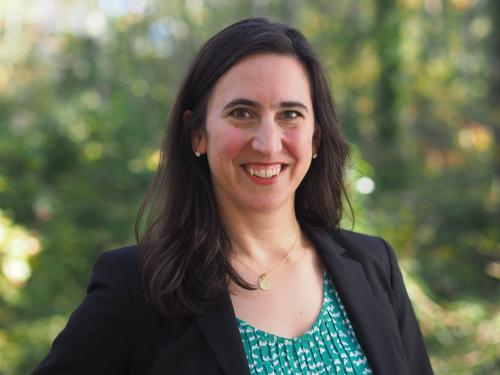
In this episode of the Policy 360 podcast, we will explore a policy idea that Republicans and Democrats seem to somewhat agree upon: expanding the Child Tax Credit.
Duke professors Anna Gassman-Pines and Lisa Gennetian join host Manoj Mohanan, interim Dean of the Sanford School of Public Policy at Duke University, to discuss their recent op-ed, "Cash Alone Won’t Relieve ‘Surviving’ American Families." They delve into the history of the Child Tax Credit and its beneficial yet incomplete impact on working-class American families. The episode is the first in a series of policy-focused conversations related to the 2024 election.
Policy 360
Better Support for Families
Conversation Highlights
Responses have been edited for clarity.
What is the Expanded Child Tax Credit?
Lisa Gennetian
The first Child Tax Credit was established in 1997 by the Tax Relief Act. And it was bipartisan. And the idea was really to reduce tax liability for families with children. It is tax relief, and the presumption there is that people, families with children, owe something to the government and we're going to reduce what they owe, recognizing that there's financial burden with raising children.
So, let's fast forward to 2021 and what happened during the pandemic and the 2021 Expanded Child Tax Credit. It was revolutionary in a couple of ways, but one of the important elements of it is that it was temporary - it's not a permanent expansion.
Anna Gasman-Pines
One of the other really revolutionary things that the 2021 expansion did that hadn't ever happened before is that half of that annual tax credit was actually paid out to families monthly. And that was a really new way of thinking about how these income supports or credits that come through the tax system could reach families and help to provide some more consistency rather than everyone having to wait until they file their tax return and then get a big lump sum at one point in time.
Was the Expanded Child Tax Credit a success?

Anna Gasman-Pines
The Expanded Child Tax really did help families financially. There's been a remarkable amount of research about this policy that only happened three years ago. And what we've seen is that by increasing the generosity of this tax credit, by making it available to more people, and by offering it in these monthly allotments, poverty went down, income went up, and families were better able to meet their basic needs.
The credit falls short in parents’ happiness
Lisa Gennetian
There's lots of reasons and lots of ways we can think about that. It might not be surprising that you can get some more money, but you're still struggling to pay bills, to get to work every day. Those of us who are parents, we know how hard it is to juggle parenting. And while a little bit of cash can offer some real relief, it might not relieve all of the demands of parenting, caregiving and working.
Anna Gassman-Pines
It’s really important to keep in mind is families were still juggling a whole lot of things at this time. So, in 2021, the pandemic still felt very real, very pressing. Many families were dealing with if loss of loved ones, continued worries about their own health and the health of their family members, a lot of uncertainty about schooling and availability of childcare and what that was going to look like. And there are so many things that parents are managing on a daily basis that of course having additional dollars that can help them meet basic needs is crucial. But while they continue to juggle all these other things, they may sometimes feel stressed or unhappy.
research-based advice for Trump or Harris on expanding the tax credit?
Anna Gassman-Pines
One thing I would advise them is - if in the back of their minds they're worried that providing more generous support to parents who are raising young children is going to keep those parents from working, I don't think we really need to worry about that as much as some folks have thought we did. There's also been really good social science [research] around the 2021 expansion, looking at whether parents who got this more generous benefit worked less and they didn't.
Lisa Gennetian

I think [the idea of parents not wanting to work] has been in many ways a driving undercurrent of how some policy choices are made – [the idea] that folks don't want to work, that they need to be prodded or incentivized. And I actually think in the U.S. context, work is really important, and parents want to work for their own identity, for the way that that serves as role models for their children, and of course, because work remains the main source of financial support for families.
[In addition, we should consider] how we welcome children in the US. And I think there's something around this time of birth that I think has mostly come up with Kamala Harris' campaign. And that very [much] lines up with a lot of things we've been talking about. There's inequalities and segregation in communities with experiences with the health system. And so, I think we can think about time of birth. (This is going to reflect my biases.) And if cash is one of those things that we can offer [to new parents] in a way that's equitable, I think there's something to that really good point of focus for policy.
Lisa Gennetian is the Pritzker Professor of Early Learning Policy Studies and Director of the PhD program at Duke Sanford School of Public Policy. Anna Gassman-Pines is Professor of Public Policy, Psychology, and Neuroscience at Duke and Senior Associate Dean for Faculty Affairs at Duke Sanford.
About Policy 360
Sanford's popular Policy 360 podcast is hosted by Sanford's interim Dean Manoj Mohanan. New episodes premiere September-May during the academic year. Guests have included luminaries like Nobel Peace Prize winner Maria Ressa, renowned writer Isabel Wilkerson and former director of the World Bank Jim Yong Kim, as well as researchers from Duke University and other institutions.
